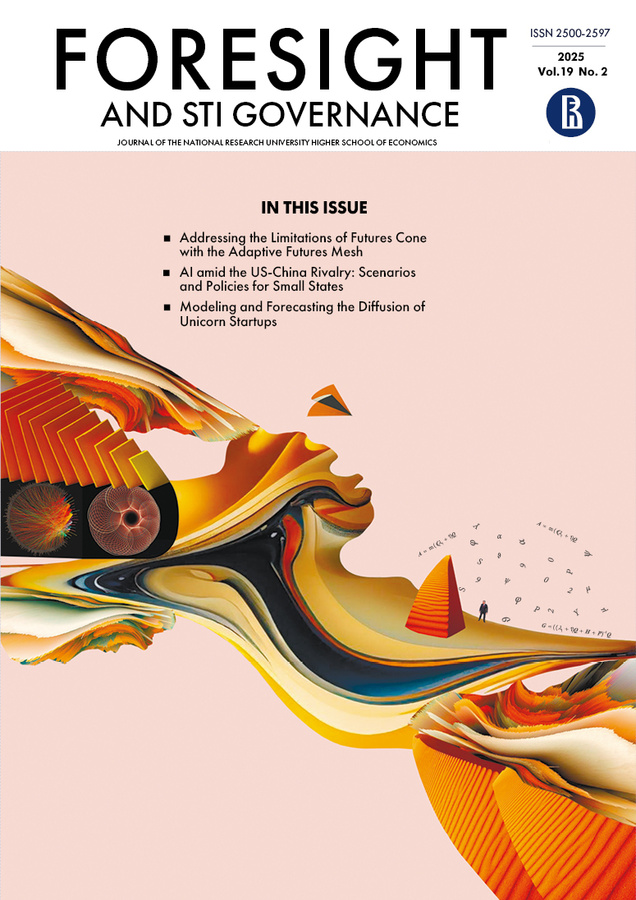Малые страны на фоне конкуренции США и Китая в сфере искусственного интеллекта
- Авторы: Кольменарес А.1
-
Учреждения:
- Национальный институт передовых исследований (IAEN)
- Выпуск: Том 19, № 2 (2025)
- Страницы: 19-27
- Раздел: СТРАТЕГИИ
- URL: https://journal-vniispk.ru/1995-459X/article/view/307342
- DOI: https://doi.org/10.17323/fstig.2025.27128
- ID: 307342
Цитировать
Аннотация
Стремительное развитие технологии искусственного интеллекта (ИИ) ведет к усилению глобальной конкуренции, меняя динамику соотношения сил между разными странами. В статье анализируются влияние распространения ИИ на перспективы соперничества в оборонной сфере между США и Китаем, а также эффекты этого процесса для небольших стран с ограниченным геополитическим влиянием. На основании обзора тематической литературы и опроса экспертов составлен набор возможных сценариев на период до 2050 г., которые описывают разные варианты развития противостояния США и Китая на Земле и в космосе, отражают соответствующие векторы стратегий для малых стран в том или ином контексте. Сценарии могут служить стратегической канвой для разработки проактивной политики национальной безопасности с учетом меняющегося международного ландшафта. Предложенные рекомендации направлены на то, чтобы «выровнять игровое поле» и помочь таким субъектам не только решать проблемы, связанные с развитием ИИ в военной сфере, но и использовать возможности, возникающие в результате технологических сдвигов. Представленные выводы формируют потенциальную основу для разработки стратегий национальной безопасности даже в условиях институциональных и инфраструктурных ограничений. Лица, принимающие решения, могут ориентироваться в сложной среде, динамизм которой во многом определяют технологии ИИ.
Об авторах
А. Кольменарес
Национальный институт передовых исследований (IAEN)
Автор, ответственный за переписку.
Email: alexis.colmenares@iaen.edu.ec
Список литературы
- Boulanin V., Saalman L., Topychkanov P., Su F., Carlsson M.P. (2020) Artificial Intelligence, Strategic Stability, and Nuclear Risk, Stockholm: Stockholm International Peace Research Institute.
- Cheung T.M. (2022) Innovate to Dominate the Rise of the Chinese Techno-Security State, Ithaca, NY: Cornell University Press.
- De Jouvenel B. (1964) L’art de la conjecture, Monaco: Ed du Rocher.
- Fernández-Montesinos F. (2019) La inteligencia artificial como factor geopolítico, Madrid: Instituto Español de Estudios Estratégicos.
- Gardner N. (2021) Clausewitzian Friction and Autonomous Weapon Systems. Comparative Strategy, 40(1), 186–198. https://doi.org/10.1080/01495933.2021.1853442
- Godet M. (1994) From Anticipation to Action: A Handbook of Strategic Prospective, Paris: UNESCO.
- Godet M., Durance P. (2011) Strategic foresight: For corporate and regional development, Paris: UNESCO.
- He T., Ji Y. (2023) China’s Techno-Economic Statecraft Amid US-China Strategic Rivalry: AI and the “New Whole-State System”. Orbis, 67(4), 605–625. https://doi.org/10.1016/j.orbis.2023.08.008
- Horowitz M., Kania E.B., Allen G.C., Scharre P. (2018) Strategic Competition in an Era of Artificial Intelligence. Washington, D.C: Center for a New American Security (CNAS).
- Horowitz M., Kahn L., Mahoney C. (2020) The Future of Military Applications of Artificial Intelligence: A Role for Confidence-Building Measures? Orbis, 64(4), 528–543. https://doi.org/10.1016/j.orbis.2020.08.003
- Hunter L.Y., Albert C.D., Henningan C., Rutland J. (2023) The military application of artificial intelligence technology in the United States, China, and Russia and the implications for global security. Defense & Security Analysis, 39(2), 207–232. https://doi.org/10.1080/14751798.2023.2210367.
- Johnson J. (2019) Artificial intelligence and future warfare: Implications for international security. Defense & Security Analysis, 35(2), 147–169. https://doi.org/10.1080/14751798.2019.1600800
- Johnson J. (2020) Artificial Intelligence in Future Hyper-Warfare: A Perfect Storm of Instability? The Washington Quarterly, 43(2), 197–211. https://doi.org/10.1080/0163660X.2020.1770968
- Johnson J. (2021) Artificial intelligence and the future of warfare: The USA, China, and strategic stability, Manchester: Manchester University Press.
- Larson E. (2021) The Myth of Artificial Intelligence, Cambridge, MA: Belknap.
- Lu S.-M. (2021) The CCP’s Development of Artificial Intelligence: Impact on Future Operations. Journal of Social and Political Sciences, 4(1), 93–105. https://doi.org/10.31014/aior.1991.04.01.255
- Malmio I. (2023) Ethics as an enabler and a constraint – Narratives on technology development and artificial intelligence in military affairs through the case of Project Maven. Technology in Society, 72, 102193. https://doi.org/10.1016/j.techsoc.2022.102193
- Mearsheimer J. (2014) The Tragedy of Great Power Politics, New York: Norton & Company.
- Mojica F.J. (2005) La Construcción del futuro: Concepto y modelo de prospectica estratégica, territorial y tecnológica, Bogotá: Universidad Externado de Colombia.
- Morgan F.E., Boudreaux B., Lohn A.J., Ashby M., Curriden C., Klima K., Grossman D. (2020) Military Applications of Artificial Intelligence: Ethical Concerns in an Uncertain World, Santa Monica, CA: RAND Corporation.
- Morgenthau H. (2005) Politics Among Nations: The Struggle for Power and Peace (7th ed.), New York: McGraw Hill Education.
- Mori S. (2018) US Defense Innovation and Artificial Intelligence. Asia-Pacific Review, 25(2), 16–44.
- Payne K., Warbot I. (2021) The Dawn of Artificially Intelligent Conflict, New York: Oxford University Press.
- PWC (2017) Sizing the prize: What’s the real value of AI for your business and how can you capitalise?, London: PWC.
- Schwartz P. (1997) The Art of the Long View: Planning For the Future in an Uncertain World, New York: John Wiley & Sons.
- Tsoukas H.T., Shepherd J. (2004) Coping with the future: Developing organizational foresightfulness. Futures, 36(2), 137–144. https://doi.org/10.1016/S0016-3287(03)00146-0
- Velázquez R., González S. (2016) El realismo clásico. In: Teorías de las Relaciones Internacionales en el siglo XXI: Interpretaciones criticas desde Mexico (eds. J.A. Schiavon Uriegas, A.S. Ortega Ramírez, M. López-Vallejo Olvera, R. Velázquez Flores), México: AMEI, pp. 285–295.
- Viglione G. (2020) China is closing gap with United States on research spending. Nature News, 15.01.2020. https://doi.org/10.1038/d41586-020-00084-7
- Waltz K. (1979) Theory of International Politics, New York: McGraw-Hill.
- Whitehead A. (1967) Modes of Thought, New York: MacMillan Company.
Дополнительные файлы








